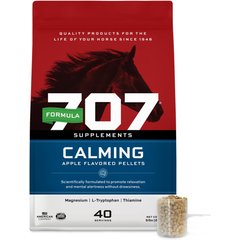Calming Supplements for Horses
K Neville/iStock / Getty Images Plus via Getty Images
Do farrier visits, horse shows, or trailer rides cause your horse to work up an anxiety-induced sweat? Are they spooking left and right when you’re leading or riding them? If you’re looking to appease your equine partner’s nervous nature, a calming horse supplement may be a good option.
Does My Horse Need a Calming Supplement?
Excitable, nervous, or hyperactive horses may benefit from a calming supplement once your veterinarian has ruled out any physical, pain-related reasons for their behavior.
Horses can also be stressed by changes in their routine, moving to a new barn, working with an unfamiliar person, or traveling in a horse trailer. In these cases, adding a calming supplement to their diet can help ease their worry while they adjust to the change.
As you navigate these events with your horse, giving them a calming supplement can also make your own experience safer and more peaceful.
Unfortunately, horses who are chronically stressed are prone to weight loss and gastric ulcers, so you’ll want to get ahead of the problem and quell excessive worrying as soon as it pops up. Common signs that your horse may benefit from a calming supplement include:
-
Excessive vocalization (specifically high-pitched whinnies or “screams”)
-
Snorting
-
Pacing the stall or fence line
-
Pawing and “dancing” on the cross-ties
-
Spooking excessively
-
Keeping head raised when they normally hold it down lower and more relaxed.
-
Not walking quietly while leading or riding
Ingredients Found in Equine Calming Supplements
Magnesium
Known for its relaxing properties for both muscles and nerves, magnesium may be useful in calming horses. Recent studies have started to look at the effects of magnesium with excitable horses. Make sure to ask your vet before starting any supplements, as magnesium in high amounts can lead to magnesium toxicity.
L-Tryptophan
An essential amino acid, L-tryptophan can only be obtained through the diet—the body cannot make it on its own. This amino acid is crucial in the production of serotonin, the “happiness hormone.” By increasing serotonin levels in the brain through oral supplementation, L-tryptophan can promote relaxation in your horse.
Serotonin is related to sedation and can lower levels of fear, stress, and aggression in animals. Research shows that it may help with encouraging calm behavior in horses, but its effectiveness seems to vary from horse to horse.
Valerian Root
This plant has been used in traditional medicine for centuries to calm nervousness and promote sleep. It is thought that valerian root interacts with a chemical messenger (GABA) that helps to regulate nerve impulses in the brain.
In humans, studies have shown that acute or chronic stress can lead to low GABA levels in the brain. Valerian root may help to reduce this breakdown of GABA, resulting in feelings of calm.
Valerian in horse supplements comes in a wide range of amounts because we do not know what an “effective” dose for a horse is at this time.
It is also important to note that valerian root may be a banned substance for some competitions. Discuss with your veterinarian before giving valerian root to your horse.
Thiamin (Vitamin B1)
Considered the single most important vitamin for stress relief, thiamin is included in many equine calming supplements. Thiamin plays a vital role in carbohydrate metabolism and nerve transmission.
Theanine
This amino acid compound is found primarily in green tea leaves. Theanine is thought to help promote neurotransmitter production, increasing levels of serotonin and dopamine to promote calm and relaxation.
How To Choose a Horse Calming Supplement
Equestrians turn to calming supplements for several reasons, but all with the same goal: to ease their horse’s mind. So what’s the best calming supplement for horses?
If you plan on competing with your horse, you’ll have to choose a product that doesn’t contain any substances prohibited by the United States Equestrian Federation (USEF). One ingredient that’s commonly found in horse calming supplements but is not horse show-legal is valerian root. Read the label carefully when shopping for a calming supplement intended for a show horse.
Also, since the ingredients in a new supplement can interfere with any medication your horse is already taking, it’s best to consult your veterinarian before topping your horse’s next grain meal with your calming product of choice.
Calming Supplements for Horses Options
Formula 707 Lifecare® Calming relies on magnesium and thiamin to help regulate an overactive nervous system. It also contains tryptophan, the amino acid associated with the production of two calming hormones: serotonin and melatonin. This calming supplement comes in a pelleted form designed to be added to the horse’s daily grain ration, with a recommended dosage of one scoop (2 ounces) per day for a 1,100-pound adult horse.
Recommended Products
UltraCruz® Calming Paste helps promote a healthy nervous system in your horse. Its unique formula contains magnesium, thiamin, and theanine. This equine calming paste comes in individual oral tubes, handy when your horse needs help to relax when traveling to a competition or before a farrier visit. The recommended dosage is 30 mL twice daily, including one administration three hours before the stressful event.
Farnam® Quietex Focusing & Calming Hay Flavor Pellets Horse Supplement helps promote calmness in stressful situations so your horse can focus on the task at hand. It combines several stress-relieving ingredients, including L-tryptophan, thiamin, magnesium, and valerian root. Feed your horse one scoop (1 ounce) of the pellets once a day.
For performance horses, give one scoop one hour before training or competition at a non-USEF-rated show, since valerian root is not allowed at USEF-sanctioned events. For shipping horses, give one scoop two hours before loading and another scoop every eight hours if needed throughout travel.

